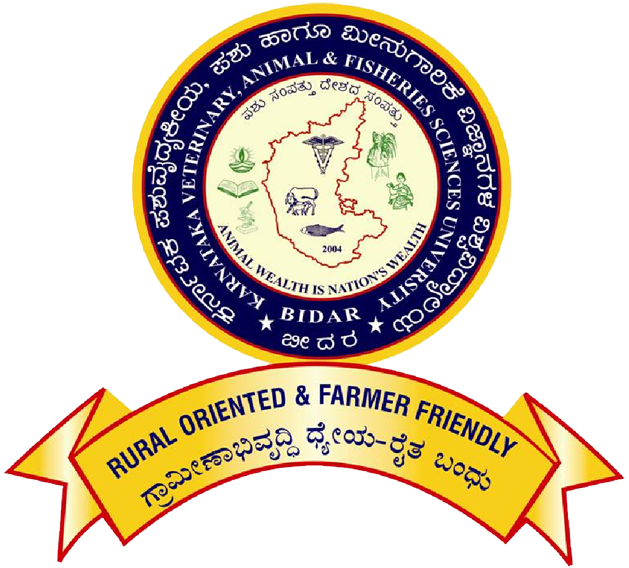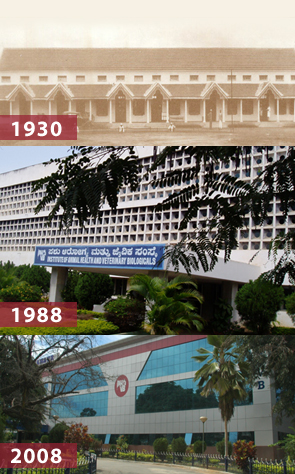ABOUT
The Institute of Animal Health and Veterinary Biologicals had a modest beginning as "Mysore Serum Institute" founded by 1926 by the erstwhile Maharaja of Mysore to produce hyper-immune serum for the control of Rinderpest Disease in the state. The name of the Institute was changed from "Mysore Serum Institute" to "Institute of Animal Health and Veterinary Biologicals" in view of the multifaceted activities undertaken by the Institute in the production of various veterinary biologicals and problem-oriented research on existing, exotic and emerging diseases of livestock.
The Institute was registered as Scientific Society under the societies registration act in 1978 to give a broader perspective and autonomous status to organize and manage its diversified activities of production of biologicals and diagnostic services through a network of units in the state. This is the only state in the country to have taken this progressive step, thanks to our predecessors who had the foresightedness.
With effect from 1.4.2006 institute stands transferred to Karnataka Veterinary, Animal and Fisheries Sciences University, Bidar. The board of management of the university has the overall control of the institute.
Formation into a scientific society with its Governing Body has facilitated the Institute to undertake prompt decisions on important policy matters for speedy implementation. The Institute maintains a close liaison with the State Department of Animal Husbandry and Veterinary Services. The Institute also has close rapport and collaboration with many of the scientific organizations and teaching institutions of the state and the country.

PHYSICAL FACILITIES, FUNDING AND GOVERNING BODY
The Institute is located in the outskirts of Bangalore City on the National Highway-7 next to the Hebbal campus of the University of Agricultural Sciences. The Institute has a land area of 71,000 sq.meters. The buildings occupy more than 6,500 Sq.meters of which the Modern Laboratory Complex has 2000 Sq. meters.
The Government of Karnataka provides all the budgetary requirements of the Institute as Grant-in-aid under the head of Animal Husbandry and Dairy Development. The Institute annually produces biologicals worth Rs.350 lakhs which are supplied free of cost through the State Department of Animal Husbandry and Veterinary Services at present, for use in the state. The Institute also assists the field veterinarians in the diagnosis of diseases of livestock and poultry for initiating proper control measures.
Other sources of funding include those allocated under plan schemes for strengthening and expansion of biological production and diagnostic services from the State and Government of India. Funds are also provided through ICAR, DBT and DST and other agencies for specific research programmes concerning animal health.
The Institute has Central Disease Diagnostic Laboratory at Bangalore and 9 Regional Animal Disease Diagnostic Laboratories at Belgaum, Bellary, Gulbarga, Shimoga, Bidar Davangere, Mysore, Mangalore and Wild Animal Disease Diagnostic Laboratory at Bannerghatta.

AIMS AND OBJECTIVES
- Large scale production of various biologicals for prophylaxis and diagnostic agents for speedy and prompt diagnosis of various livestock and poultry diseases. Produces 7 Bacterial Vaccines, 9 Viral vaccines and Diagnostic antigens.
- To provide prompt and effective diagnostic services for identification of disease problems with an aim to eradicate them.
- To adopt new technologies in the development of cost effective and efficient biologicals and diagnostic aids.
- To under take in-depth study on animal disease epidemiology with emphasis on rural economy and cost benefits.
- Training of scientific and technical personnel in the recent advances in the technology of biological production and disease diagnosis and also to impart knowledge to the farmers in raising healthy animals and poultry.
RESEARCH
Right from its inception, the Institute has executed many research schemes and programmes. The research activities, mostly applied, relate mainly to two areas.
- Development of New Vaccines against common animal diseases and improvement in vaccine production technology
- Diagnosis and study of animal diseases their epidemiology for purposes of disease monitoring, surveillance and forecasting.







